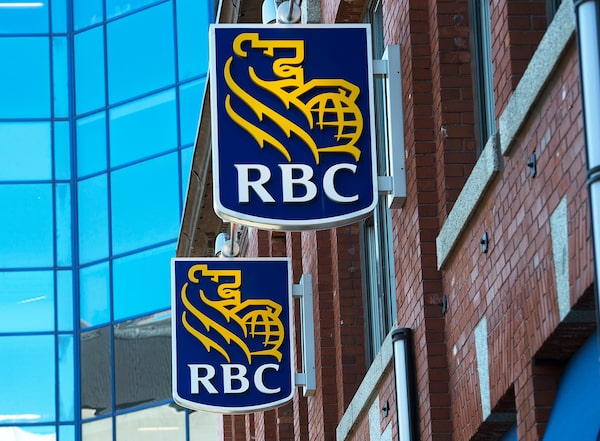
The RBC Royal Bank of Canada logo is seen in Halifax on Tuesday, April 2, 2019. Royal Bank of Canada has signed a deal to sell its banking operations in the Eastern Caribbean to a consortium of indigenous banks in the region. THE CANADIAN PRESS/Andrew VaughanAndrew Vaughan/The Canadian Press
Royal Bank of Canada will require all staff in this country and the United States to be fully vaccinated to work on the company’s premises, making it the first Big Six bank and the largest domestic financial institution to introduce a vaccine mandate.
The bank’s decision was driven by “concerning developments related to the Delta variant and evolving government guidance,” chief human-resources officer Helena Gottschling said in a memo sent to staff on Thursday afternoon.
All employees must attest that they are fully vaccinated by Oct. 31 to return to offices, branches and other RBC buildings. The mandate will apply first in Canada and the U.S., “followed by other regions where applicable,” Ms. Gottschling said in the staff memo.
“We will be requiring RBC employees to be fully vaccinated to work on our premises,” she said, according to a copy of the memo obtained by The Globe and Mail.
An RBC spokesperson declined to comment beyond the contents of the company memo.
In Canada, some large employers’ attitudes toward vaccination mandates have shifted and political pressure in favour of vaccine requirements has increased. Ottawa announced last Friday that it will require vaccinations for federal employees and many domestic travellers, and said it expects other federally regulated employers such as banks and telecommunications companies to do the same, without forcing them to comply.
Earlier this week, Sun Life Financial Inc., Canada’s second-largest insurer, told its 12,000 Canadian employees that they must receive the COVID-19 vaccination in order to return to offices in Toronto, Montreal and Waterloo, Ont., starting with staff coming in voluntarily as part of a pilot project.
In mid-July, Ms. Gottschling said in an interview that RBC was not planning to mandate vaccinations for employees working onsite – a position other banks echoed at the time.
But in the internal memo this week, Ms. Gottschling said RBC has “made adjustments along the way,” as the pandemic progresses, based on shifting regional conditions and evolving guidance from governments as well as public-health authorities.
“Increasingly, governments and organizations around the world are announcing plans to make vaccinations mandatory and many are adjusting guidance related to mask use, self-isolation and social distancing,” she said.
All of Canada’s six largest banks have encouraged employees to get a COVID-19 vaccine, and some have helped hold clinics to deliver shots. But RBC is the first to require vaccinations for all staff working onsite, in anticipation of a gradual return to offices that could start this fall. The mandate includes staff working in capital markets who are provincially regulated.
RBC has been drafting return-to-office plans that will allow many employees who have worked remotely to keep some flexibility in their work arrangements, with limits. Eventually, the bank expects most staff will spend two to four days a week at offices, and advises them to live within a commutable distance. To guide managers, the bank has been handing out a 16-page hybrid-work playbook.
“Vaccinations – combined with other health measures – remain the best way for everyone to help protect our clients, colleagues and communities,” Ms. Gottschling said in the memo.
Some U.S. banks, such as Citigroup Inc., are requiring vaccinations for staff returning to offices in major cities such as New York and Chicago. Others, including Goldman Sachs Group Inc., require U.S. employees to report their vaccination status.
In Canada, Seneca College and a number of Ontario universities are requiring vaccinations for staff and students coming to campuses, and some smaller companies have also implemented vaccine mandates, such as law firm Bales Beall LLP and accounting firm Crowe Soberman Associates.
RBC operates in 36 countries and cited “global differences in vaccine deployment efforts and access” as a reason for choosing to roll out a mandate more gradually for offices outside North America. Ms. Gottschling also acknowledged “that some employees are not able to get the vaccine,” promising to tailor the bank’s approach “with those situations in mind.”
The initial vaccination mandate covers more than 74,000 full-time RBC employees who work in Canada and the U.S., compared with about 9,400 who work in other countries, according to company filings.
Your time is valuable. Have the Top Business Headlines newsletter conveniently delivered to your inbox in the morning or evening. Sign up today.
 James Bradshaw
James Bradshaw